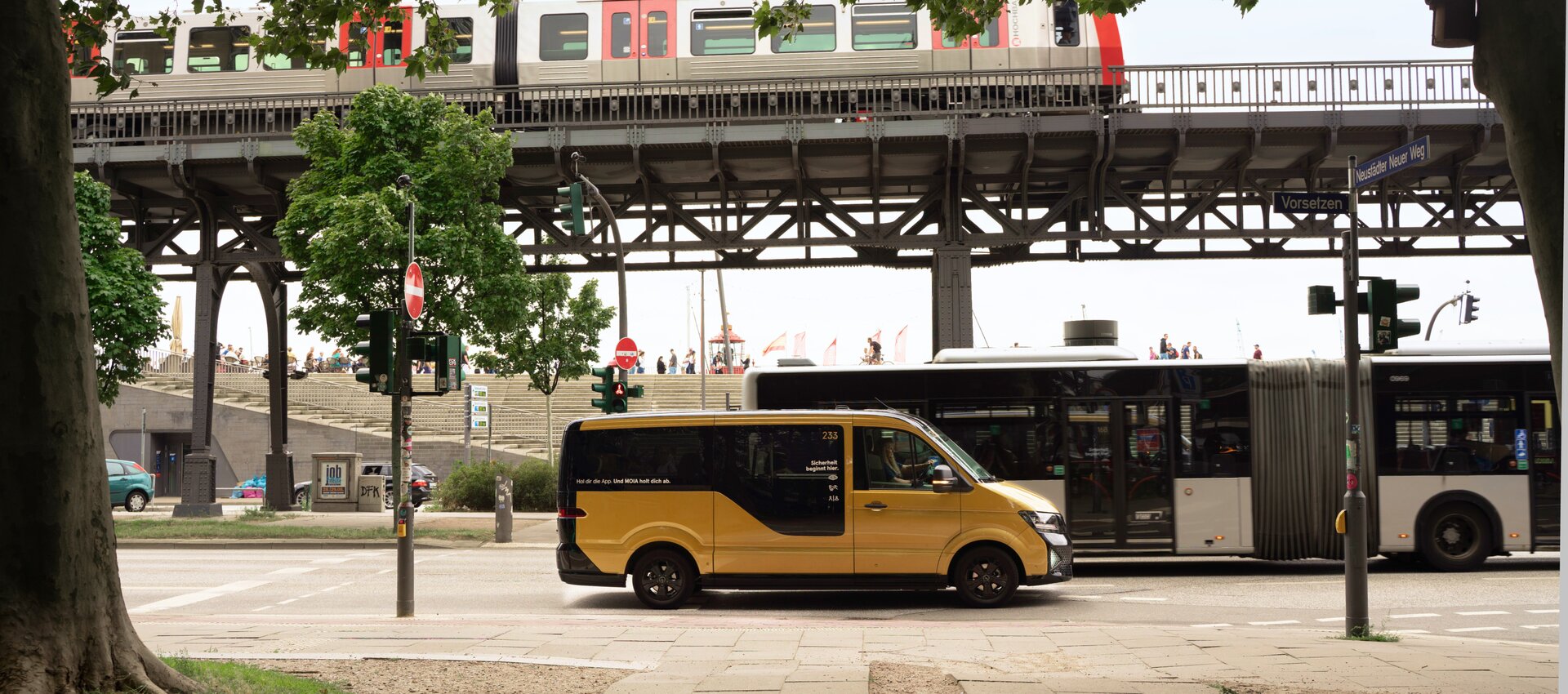Does the Deutschland-Ticket affect demand for ridepooling services like MOIA?
Starting May 1, 2023, the Deutschland-Ticket will enable the use of local and regional public transport throughout Germany with a flat rate of 49 euros per month. The introduction is widely viewed as an important step toward more sustainable and affordable public transportation and is akin to a revolution in the fare jungle of Germany's public transportation associations.
In an initial forecast, the Association of German Transport Companies (VDV) assumes that around eleven million of the current twelve to fourteen million public transport season ticket holders will opt for the Deutschland-Ticket in the future. Added to this are a forecast 5.6 million potential new customers.
Study: MOIA demand remains stable in spite 9-euro ticket
Apart from the nationwide free public transport system in Luxembourg, there are few examples of such a large-scale, low-cost public transport ticket. The 9-Euro-Ticket has already had a substantial impact on the mobility landscape in Germany - and has led to intensive discussions about the traffic benefits and its financing. For private mobility providers, besides the fundamental support for low-cost public mobility, there was also the fear of experiencing a slump in their own demand. MOIA, as a knowledge-based company, took the introduction of the 9-Euro-Ticket last year as an opportunity to investigate the impact of a low-cost public transport fare on MOIA in the study "Ridepooling under the influence of the 9-Euro-Ticket" (German only).
Through a survey and trip analysis of over 1,300 MOIA customers, the study provides insights into the implications of the 9-Euro ticket upon the MOIA demand. The detailed analysis of the respondents revealed,
- that existing customers who had a 9-Euro ticket did not ride MOIA significantly less than existing customers who did not have a 9-Euro ticket during the period studied from June to August 2022.
- This shows that fare is only one of many criteria influencing the choice of transport mode. MOIA continues to be used as a supplement on routes where conventional public transport cannot offer an attractive connection, e.g., due to the need to switch trains and buses or a thinned-out frequency.
- In addition, holders of the 9-euro ticket have been able to use more of their existing mobility budget for MOIA trips. This strengthens public multimodal mobility.
Moreover, we know from the MOIA accompanying research that holders of public transport passes use MOIA more frequently. At the same time, MOIA users are above average multimodal and very mobile: Three out of four users use at least two different means of transport every week. This flexibility is also reflected in the high availability of various mobility options such as bike and car sharing.
Multimodal mobility: How private mobility providers such as MOIA benefit from the Deutschland-Ticket
Although the low-cost public transport offer may seem like direct competition for new mobility services like MOIA, we welcome the introduction of the Deutschland-Ticket as a positive step towards a more sustainable and efficient mobility mix. Our research shows that MOIA demand is not sustainably affected by low-cost public transport. On the contrary, we expect the new ticket to provide an incentive to use public transport more often. The Deutschland-Ticket simply makes it easier for more people to integrate public transportation into their daily lives on a permanent basis. At the same time, MOIA benefits from the promoted multimodality as an essential part of the urban mobility mix.
At MOIA, we see ourselves as part of the urban mobility transition and have been integrated into public transport in Hamburg since 2023. As part of the public transport system, MOIA cooperates with the Hamburg Transport Association: Holders of an HVV subscription or the Deutschland-Ticket receive a discount of one euro on the basic fare at MOIA. The tariff cooperation between HVV and MOIA is another important step toward closer integration between large-scale on-demand services and public transportation in Hamburg. A well-developed "classic" public transport system is always the backbone of urban mobility, which is meaningfully supplemented by other forms of mobility such as ridepooling. The aim is for people to leave their own vehicles behind and switch to an attractive mix of different services. Ultimately, the providers of mobility services in the city benefit from the Deutschland-Ticket.
